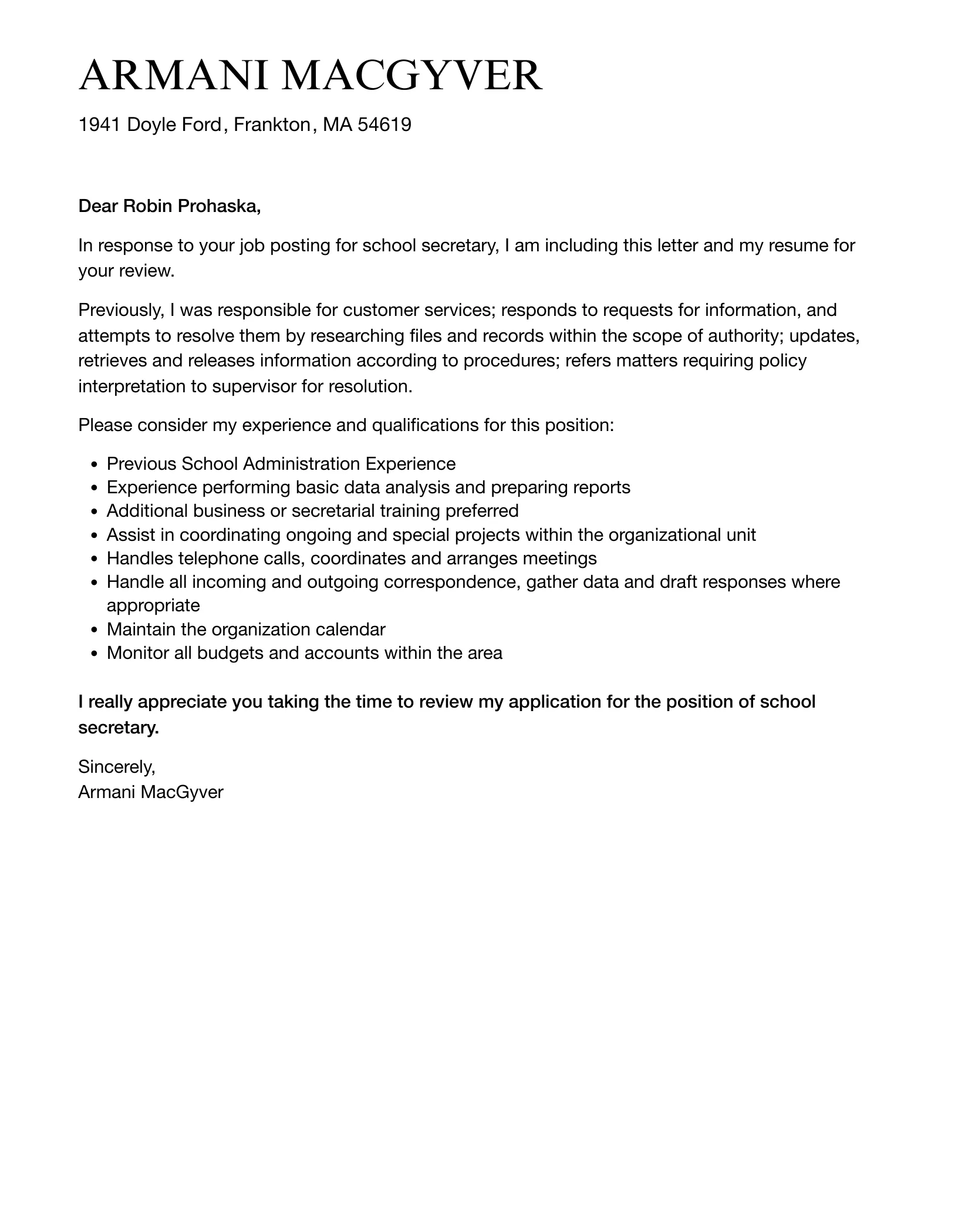Key Skills for a Secretary Cover Letter
A well-crafted secretary cover letter is your first impression. It’s your opportunity to showcase your skills and experiences to a potential employer. To win the job, it must effectively highlight the key skills that make you a qualified candidate. Emphasizing these abilities will increase your chances of landing an interview and ultimately, the job. This guide provides vital tips for crafting an outstanding cover letter that highlights your strengths and helps you stand out from the competition. Remember that the cover letter is your chance to shine before the interview. You can use the skills listed on this article to improve your chances.
Communication Skills
Secretaries are the face of the office, making communication skills vital. They are central to every office operation. This includes both written and verbal communication. Ensuring clear and concise communication is fundamental for the role. Your ability to convey information accurately is pivotal, whether it’s answering phone calls, writing emails, or preparing documents. Demonstrating excellent communication helps to build strong relationships with colleagues and clients alike. Always make sure you provide clear information, and follow the business tone style.
Written Communication
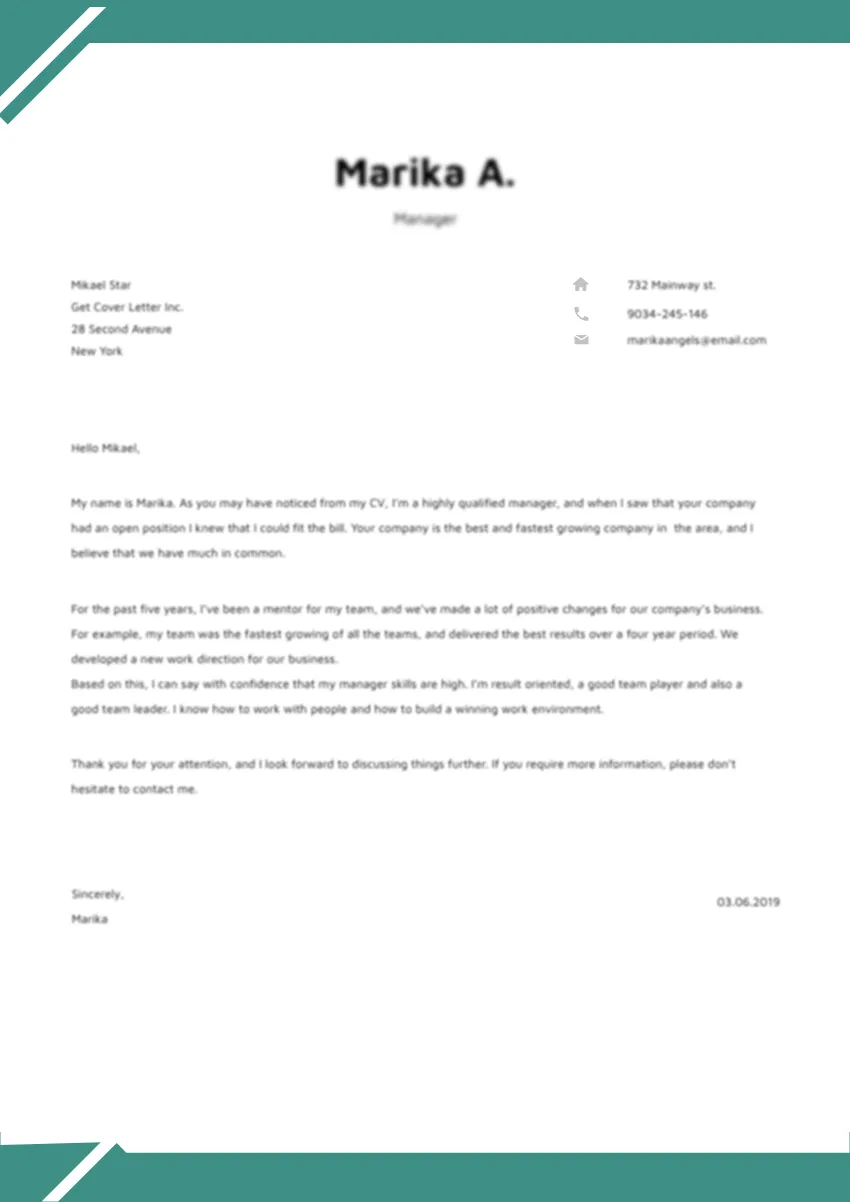
Written communication encompasses composing emails, memos, and letters. Proofreading is essential. Secretaries must write in a clear and concise manner, using proper grammar and spelling. They must also be able to adapt their writing style to suit different audiences and contexts. You must display your best in the way you write, and you can also include your previous writing experience. When writing a cover letter, make sure to put all your best qualities on display.
Verbal Communication
Verbal communication includes phone calls, meetings, and face-to-face interactions. Secretaries must be able to speak clearly and confidently. They should also be active listeners. The ability to handle phone calls professionally is a key requirement for a secretary. You must demonstrate courtesy and respect for every single phone call. Your tone should always be friendly and inviting. If you are bilingual or trilingual, make sure to indicate on your cover letter.
Organizational Skills
Effective organizational skills are key for any secretary. They are essential for managing multiple tasks and deadlines. You must be able to maintain an organized workspace, manage files, and schedule appointments. A secretary with good organizational skills can keep an office running smoothly and efficiently. Having this skill will make you stand out and give you an advantage. Your resume can include your previous organizational experience.
Time Management
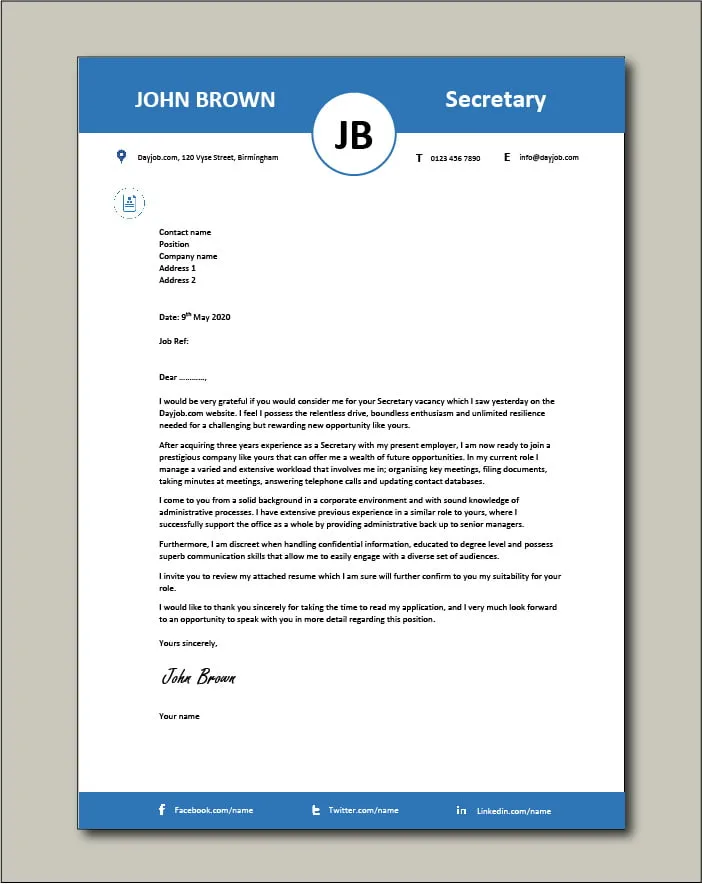
Time management is critical for secretaries. You must be able to prioritize tasks and meet deadlines. Secretaries often juggle multiple responsibilities simultaneously. Efficient time management ensures all tasks are completed on time. Prioritizing the most important tasks first is an important part of time management. This ensures that urgent matters are addressed promptly.
Prioritization
Prioritization involves assessing and ranking tasks based on urgency and importance. You need to identify what needs to be done first. This skill helps secretaries focus on the most critical activities. Effective prioritization prevents delays and ensures that deadlines are met. If you are able to determine what needs the most attention, you will be one step closer to getting hired.
Attention to Detail
Attention to detail is crucial for a secretary. Accuracy is paramount in all tasks, from data entry to preparing documents. Secretaries must be meticulous and thorough in their work. The ability to catch errors and ensure accuracy is highly valued. Attention to detail prevents mistakes and enhances the overall quality of work.
Proofreading
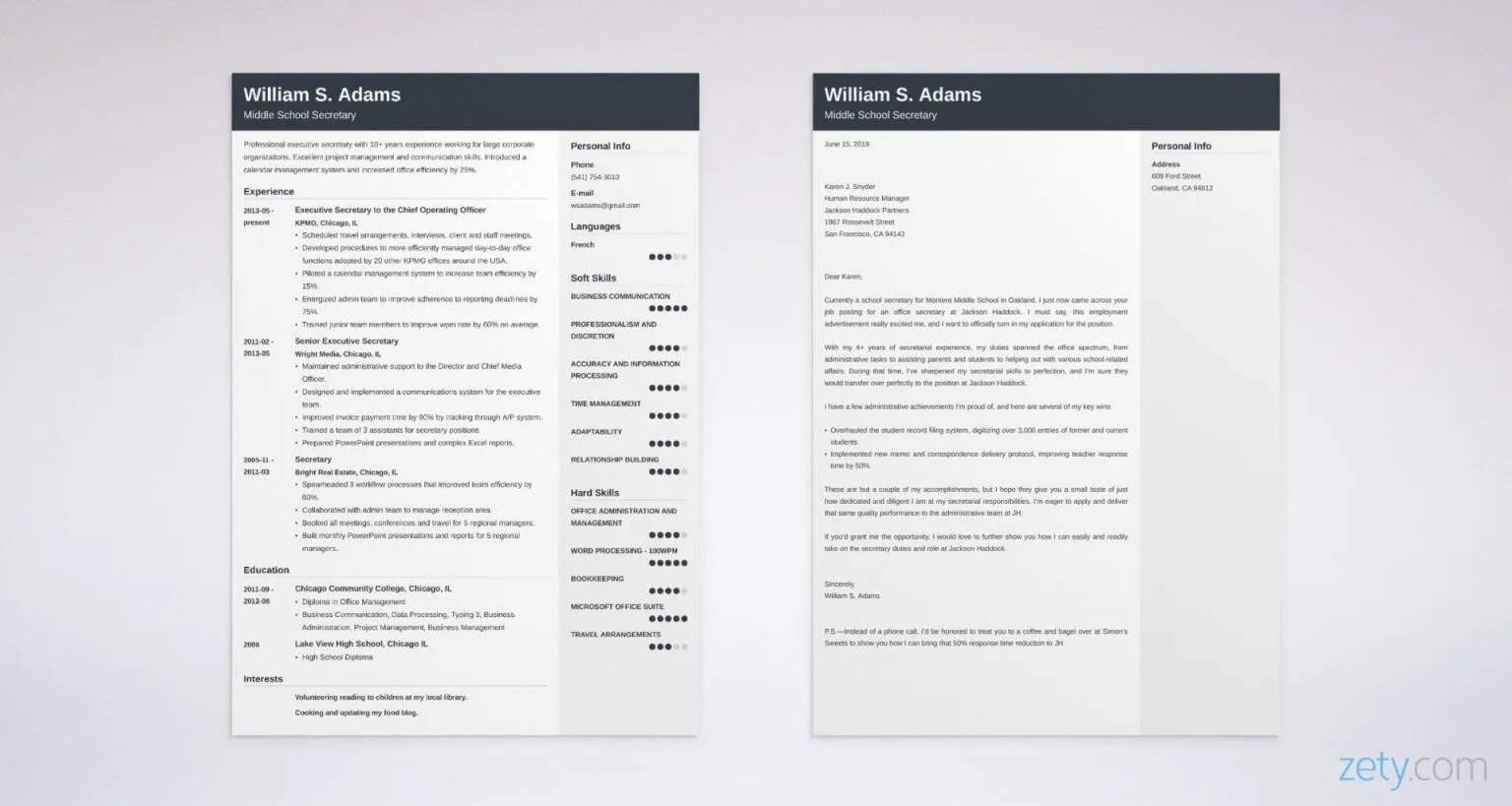
Proofreading involves reviewing documents for errors in grammar, spelling, and punctuation. It is a critical skill for secretaries. This is a skill that any secretary must possess. This ensures that all written materials are polished and professional. You can ask a colleague to proofread your documents as well. Always take your time before sending your documents to your boss.
Accuracy
Accuracy is essential in all aspects of a secretary’s job, including data entry, record-keeping, and correspondence. You must maintain a high level of accuracy to avoid mistakes and errors. This skill reflects the secretary’s ability to produce reliable and trustworthy work. It is important for maintaining the integrity of the information. When working with important data, make sure you don’t skip any details.
Formatting a Winning Secretary Cover Letter
The format of your cover letter is very important. Your formatting has to be appropriate for the job. Creating a cover letter that stands out is key to landing a secretary position. Proper formatting and presentation enhance your cover letter. The cover letter should be well-structured, easy to read, and professional in appearance. A well-formatted cover letter will make the hiring manager impressed with your attention to detail and professionalism. These aspects will improve your chances of getting the job.
Header Information
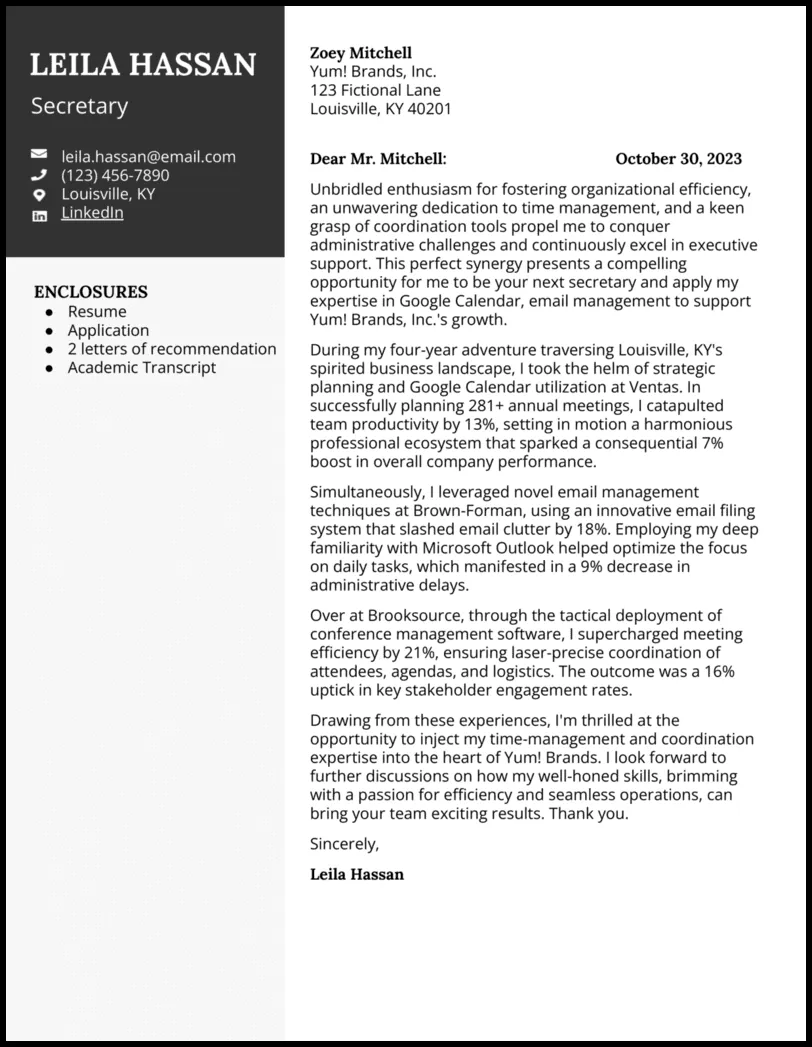
The header includes your contact information and the date. This section ensures that the hiring manager can easily contact you. The header also includes the recipient’s information, such as their name and title. You should keep your contact information concise and accurate. Your contact information should include your full name, address, phone number, and email address.
Applicant’s Contact Information
This includes your full name, address, phone number, and email address. Your contact information should be easy to find. Ensure the information is current and accurate. Double-check for any typos or errors. Use a professional-looking email address.
Date
The date should be included directly under your contact information. Use the current date. This is important for the employer. The date indicates when the letter was written. This can easily show the current date you are applying for the job.
Recipient’s Information
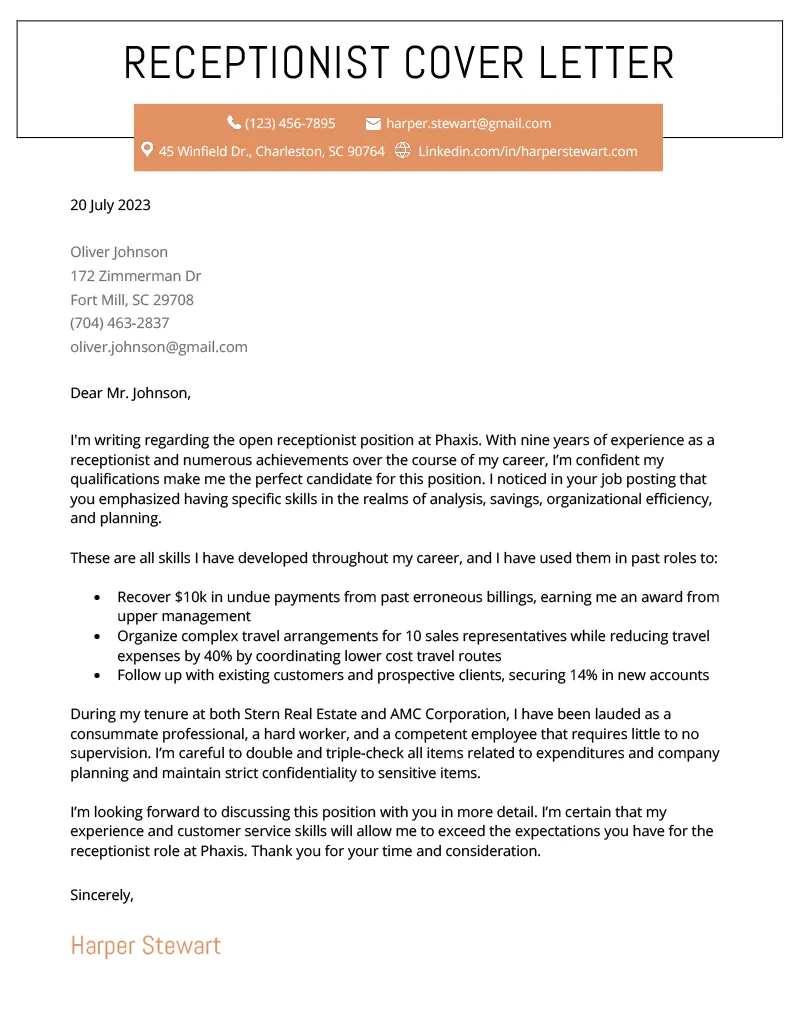
The recipient’s information goes below the date. This typically includes the hiring manager’s name and title. Research the correct name and title. If the name is unknown, use a general salutation. This allows you to address the hiring manager directly. Always make sure you know the person you will be addressing your cover letter to.
Body Paragraphs
The body paragraphs should include an introduction, highlights of your skills, quantifying achievements, and a call to action. The body of your cover letter is where you showcase your skills and experiences. The content of your cover letter should be clear and concise, easy to follow. Be sure to provide a concise description of your key qualifications. Avoid generic phrases or clichés.
Introduction
The introduction should state the position you’re applying for. Make sure you state why you are interested in the role. Briefly mention how you learned about the job. This allows the hiring manager to quickly understand the purpose of your letter. Always start with a captivating opening statement. Make sure to be enthusiastic about the job.
Highlighting Relevant Skills
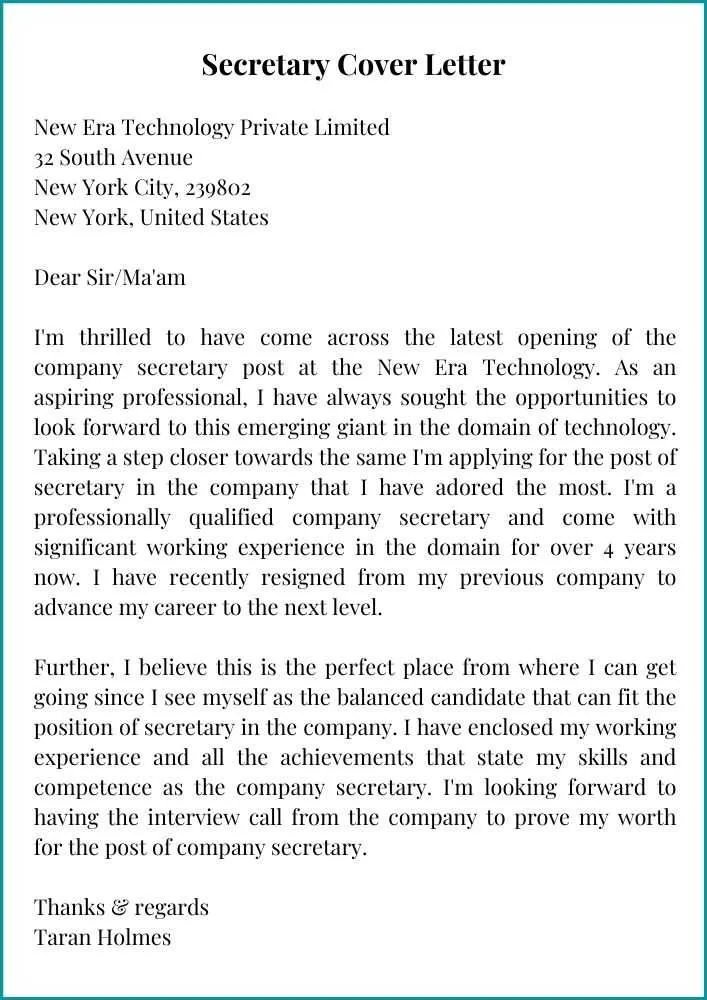
Focus on the skills most relevant to the secretary role. Reference the job description to identify the key skills. Provide specific examples of how you have used these skills. This shows you understand the job requirements. Your goal is to describe your skills accurately. Use strong action verbs to describe your accomplishments.
Quantifying Achievements
Whenever possible, quantify your accomplishments. Use numbers or data to demonstrate your impact. This provides concrete evidence of your abilities. For example, you could mention the number of emails handled or the percentage of efficiency improvement. Use metrics to prove your worth and accomplishments. The purpose is to make a strong impact with your experience.
Call to Action
End the letter with a clear call to action. Express your interest in an interview. Thank the hiring manager for their time and consideration. Provide your contact information again. This encourages the hiring manager to take the next step. You want to ensure they know the next step to take.
Formatting and Presentation
Formatting and presentation are crucial for making a positive impression. A well-formatted cover letter looks professional and easy to read. The font and size should be easy on the eyes. Keep the margins consistent. Always remember to proofread your letter. Proper formatting demonstrates your attention to detail and organizational skills.
Font and Font Size
Choose a professional and easy-to-read font. Popular choices include Times New Roman, Arial, and Calibri. Use a font size between 11 and 12 points. This ensures the text is readable without being too large or too small. The font size should be easy on the eyes. Avoid using decorative fonts.
Margins
Use standard margins, typically 1 inch on all sides. This ensures there is enough white space. Do not use excessive margins, as this can make the letter look unprofessional. Consistent margins provide a clean and organized appearance. Be consistent throughout your letter.
Proofreading for Errors
Proofread your cover letter multiple times. Check for spelling, grammar, and punctuation errors. Use a grammar checker to catch any mistakes. Ask someone else to proofread your letter. Errors can undermine your credibility. Always remember to double-check for any errors.
Tailoring Your Cover Letter
To make a positive impression, you must customize your cover letter. Your cover letter should be tailored for each specific job application. This shows the employer that you are serious about the position. Tailoring your cover letter is key to success. You can tailor it by researching the company, highlighting relevant experience, and using keywords from the job description.
Researching the Company
Research the company before writing your cover letter. Understand the company’s values, mission, and culture. Use this information to tailor your letter to their specific needs. This demonstrates your interest in the company. You can look up the company on their website to get all of their information. You will have to research information to showcase your interest in the company.
Highlighting Relevant Experience
Focus on the experiences that are most relevant to the job. Match your skills and experiences to the job description. Provide specific examples of how you have excelled in similar roles. You have to show off the experience you have. Your previous experience should show how you have accomplished the job.
Using Keywords from the Job Description
Carefully review the job description and identify key keywords. Use these keywords naturally throughout your cover letter. This helps the hiring manager recognize your qualifications. If you use their keywords, you will have a great chance of landing the job. Avoid keyword stuffing.
Common Mistakes to Avoid
There are several common mistakes that you must avoid in your cover letter. These mistakes can damage your chances of getting the job. Avoiding these errors will increase your chances of a positive outcome. It is important to pay attention to detail. Always keep your cover letter professional and focused. Some of these mistakes include: generic cover letters, typos and grammatical errors, and a lack of enthusiasm.
Generic Cover Letters
Avoid using a generic cover letter that is not tailored to the specific job. Make sure your cover letter is tailored for each application. Generic letters show a lack of effort. Make sure you always tailor your cover letter for each job. Highlight your skills and experiences relevant to the role.
Typos and Grammatical Errors
Typos and grammatical errors make you look unprofessional. Always proofread your cover letter carefully. Mistakes show a lack of attention to detail. Use a grammar checker. You can also ask someone else to proofread your letter. Make sure your cover letter has no errors.
Lack of Enthusiasm
Your cover letter should show enthusiasm for the job. If you sound disinterested, the hiring manager will not be interested. Express your excitement and interest in the role and the company. Your enthusiasm will make you more memorable. Always make sure you sound enthusiastic for the job.
Conclusion
Writing a strong cover letter is essential for getting a secretary job. By highlighting your key skills, formatting your letter correctly, tailoring it to the job, and avoiding common mistakes, you can significantly improve your chances of success. Use these tips to create a winning cover letter that showcases your abilities and helps you land the job. Your cover letter is your chance to make a positive first impression. Good luck with your job search!
